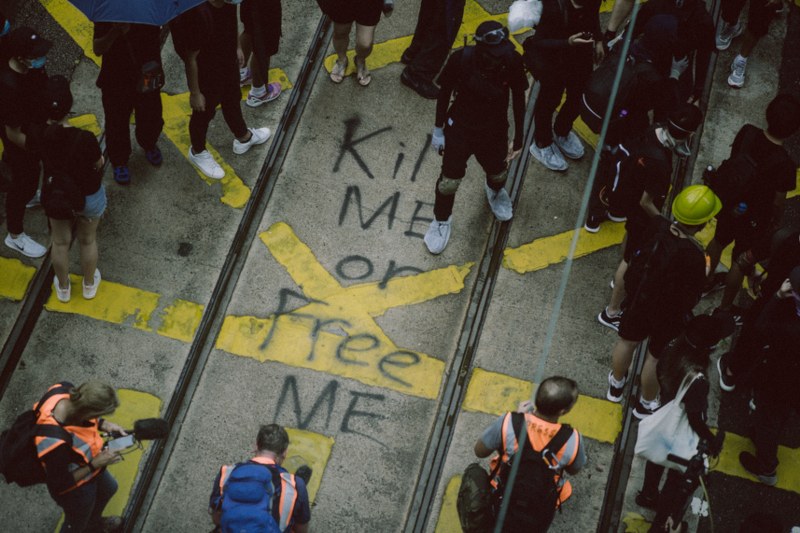 Tiananmen Square
Tiananmen Square Tiananmen Square massacre: Hong Kong Police detain 16 people on anniversary
Police in Hong Kong on Sunday detained 16 pro-democracy activists on the anniversary of the Tiananmen Square massacre, media reports said.
Security chief Chris Tang Ping-keung had earlier warned authorities would take “resolute action” against anyone threatening national security as the date approached, and hundreds of officers fanned out across Victoria Park and nearby streets in Causeway Bay on Sunday, checking bags of passers-by and cautioning residents who stopped to linger, reports South China Morning Post.
On the international front, the diplomatic missions of the United States and European Union displayed electric candles in the windows of their offices in Central, while the consulates of Australia, Britain and Canada released messages commemorating the anniversary, the newspaper reported.
The vigil in Victoria Park has not taken place in the city since 2019.
According to reports, It used to draw tens of thousands of residents on June 4.
Among those detained by officers on Sunday was Chan Po-ying, the leader of the League of Social Democrats opposition political party and who was carrying an LED candle and yellow paper flowers, reports South China Morning Post.
Leo Tang Kin-wah, former vice-chairman of the disbanded Confederation of Trade Unions, was escorted into a police vehicle after being searched by officers and taken to the station in Wan Chai. He was wearing a black T-shirt with a print of the front page of the Chinese-language newspaper Wen Wei Po from June 5, 1989.
Police also led away the former chairwoman of the Hong Kong Journalists Association, Mak Yin-ting, and activist Alexandra Wong Fung-yiu, known as “Wong Po Po” or “Grandma Wong”, as she stood on Great George Street holding a bouquet of flowers. Some passers-by chastised police for taking action against an elderly woman, the newspaper reported.
The US State Department on Saturday said it will continue advocating for people’s human rights and fundamental freedoms in China and around the world.
"Tomorrow, we observe the 34th anniversary of the Tiananmen Square Massacre. On June 4th, 1989, the Government of the People’s Republic of China (PRC) sent tanks into Tiananmen Square to brutally repress peaceful Chinese pro-democracy protesters and bystanders alike. The victims’ bravery will not be forgotten and continues to inspire advocates for these principles around the world," read the statement.
The Tiananmen Square protests, known as the June Fourth Incident in China, were student-led demonstrations held in Tiananmen Square, Beijing in 1989.
In what is known as the Tiananmen Square Massacre, troops armed with assault rifles and accompanied by tanks fired at the demonstrators and those trying to block the military's advance into Tiananmen Square.
Hundreds of students were killed by the Chinese troops in Beijing's Tiananmen Square on June 4, 1989.
However, the exact number of deaths in the incident is still unknown.
In 2017, newly released UK documents revealed that a diplomatic cable from then British Ambassador to China, Sir Alan Donald, had said that 10,000 had died,reported BBC.
What led to the protest?
The protests were precipitated by the death of pro-reform Chinese Communist Party (CCP) general secretary Hu Yaobang in April 1989 amid the backdrop of rapid economic development and social change in post-Mao China, reflecting anxieties among the people and political elite about the country's future.
The reforms of the 1980s had led to a nascent market economy that benefited some people but seriously disadvantaged others, and the one-party political system also faced a challenge to its legitimacy.
Common grievances at the time included inflation, corruption, limited preparedness of graduates for the new economy, and restrictions on political participation.
Although they were highly disorganized and their goals varied, the students called for greater accountability, constitutional due process, democracy, freedom of the press, and freedom of speech.
Workers' protests were generally focused on inflation and the erosion of welfare. These groups united around anti-corruption demands, adjusting economic policies, and protecting social security.
At the height of the protests, about one million people assembled in the square.
On this day 34 yrs ago, Chinese troops shot dead hundreds, if not thousands, of peaceful protesters in & around Beijing’s Tiananmen Square.
— Amnesty International (@amnesty) June 4, 2023
The events of June 4, 1989, remain censored in mainland China and, increasingly, in Hong Kong.
But they will not be forgotten. pic.twitter.com/JOGeRlKOI5
On the #Tiananmen Square massacre remembrance day, #PRC generals threaten to use force against #Taiwan to deprive us of our freedom & democracy. We’ll stay free & resilient to remind the Chinese people there’s hope. We won’t forget what happened 34 years ago today. JW pic.twitter.com/EFr7UAHCs7
— 外交部 Ministry of Foreign Affairs, ROC (Taiwan) 🇹🇼 (@MOFA_Taiwan) June 4, 2023
Support Our Journalism
We cannot do without you.. your contribution supports unbiased journalism
IBNS is not driven by any ism- not wokeism, not racism, not skewed secularism, not hyper right-wing or left liberal ideals, nor by any hardline religious beliefs or hyper nationalism. We want to serve you good old objective news, as they are. We do not judge or preach. We let people decide for themselves. We only try to present factual and well-sourced news.







